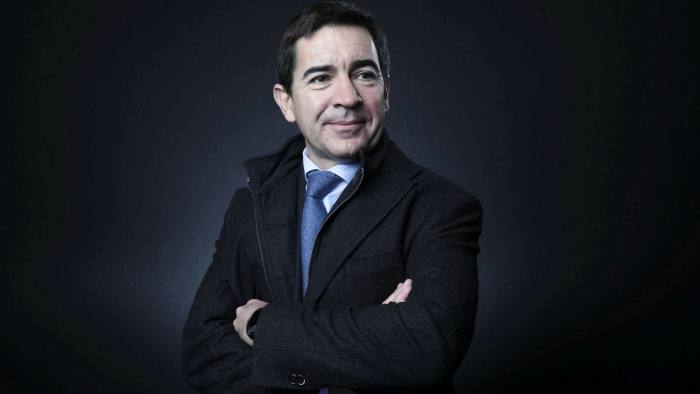
BBVA calls for easing of coronavirus restrictions
Spanish bank’s chairman Carlos Torres says move is needed to kick-start economy
by Daniel Dombey, Stephen MorrisBBVA, Spain’s second-largest bank by market capitalisation, said it would cut its internal financial targets for this year and called for the relaxation of coronavirus restrictions to help kick-start the economy.
“Financial targets, for sure, we will need to revise them because profitability levels will be heavily impacted this year and next,” Carlos Torres, executive chairman, said in an interview. “What we had in our budgets is not something that we can achieve.”
BBVA’s internal targets are not public. It recorded an 11.9 per cent return on tangible equity in 2019, and market consensus has already slashed its expected 2020 profits from about €4.7bn before the crisis to €2.1bn.
Mr Torres was speaking weeks after BBVA booked €1.43bn in provisions for potential bad loans for the first three months of the year, pushing it to a €1.8bn loss — its largest ever quarterly loss. The Spanish lender’s shares have almost halved since mid-February.
“Certainly our level of profits is not going to be what it was, in double-digit returns on equity,” said Mr Torres, speaking by video from his Madrid home. “When we return to normal depends on when we pass this crisis.”
His comments cast light on how one of the biggest lenders in a country still scarred by the last financial crisis plans to cope with the current economic turmoil, and come as banks are taking divergent approaches to assessing possible future losses.
Lockdowns have proved certainly successful in controlling the pandemic, but there has been a toll to the economy that has been quite significantCarlos Torres, BBVA executive chairman
Mr Torres said charges in the second quarter were likely to be lower than in the first, and suggested BBVA had acted more decisively than many of its peers by making bigger first-quarter provisions. For the year as a whole, BBVA expects to take provisions equivalent to between 1.5 and 1.8 per cent of its total outstanding loans. As well as Spain, it also has extensive assets in Mexico, Turkey and the US.
The BBVA chairman said that the unprecedented nature of the pandemic — and the fact that banks have eased loan terms for millions of clients — made it particularly hard for lenders to forecast losses. BBVA itself has relaxed conditions for 3m clients, who are not judged to be late payers. Despite the crisis, the bank’s lending has gone up in each of the past three months although mainly to corporate and self-employed clients rather than to consumers.
“You are inevitably going to have people not able to pay but that is a tough calculation; it is a modelling exercise, it is not a mathematical formula,” said Mr Torres.
But, he added that the Spanish sector, one of the worst hit by the financial crisis a decade ago, was well-enough capitalised to withstand the effects of the pandemic. He pointed to loan-to-deposit ratios, which are now below 100 per cent across the sector, more than a third down from their previous levels.
Mr Torres said that even if Spanish banks made “humongous” loan loss provisions of up to six times current expectations, which he did not expect, “what you come out with is capital levels that withstand the requirements, by and large”. He added that households and companies were both significantly less leveraged than they had been during the financial crisis a decade ago.
Spain has been one of the countries worst hit by the coronavirus, in both human and economic terms. It has also had one of the strictest lockdowns, which is now being phased out.
“Lockdowns have proved certainly successful in controlling the pandemic, but there has been a toll to the economy that has been quite significant,” said Mr Torres. “So if we want to avoid a deeper economic impact that may be irreversible, measures should be compatible with maintaining infection rates, [keeping] contagion at bay [while] reactivating the economy. The best way to reconstruct is not to destroy.”
Recommended
Eurozone economy
Coronavirus hit to eurozone economy set to dwarf financial crisis
The BBVA chairman suggested that countries should “max out” on masks, tracing apps, isolation and social distancing — “actions that don’t have adverse impacts on the economy right now and are very effective” — and seek to roll back new trade and border controls. He added: “Protection of vulnerable groups should also be maxed out but maybe not on the rest of the groups.”
One legacy of the pandemic was that bank branches would become much less important in the future, said Mr Torres. “As we go back, we will be much more remote, because it has been proven to provide a good service; clients are happy.” BBVA did not currently have plans to shut down branches or dismiss staff, he added.
An acceleration of the shift to digital could make mergers in the Spanish banking sector less likely: “By leveraging digital, the attractiveness of buying a traditional franchise is reduced,” said Mr Torres. As of March, 63 per cent of the bank’s sales were via digital channels, compared with 16 per cent in 2016.
BBVA was formally placed under investigation by a Spanish court last July in a case featuring allegations of espionage and bribery. But Mr Torres said the case — which involves a former police commissioner whose services the bank employed for more than €10m between 2004 and 2017 — was not affecting the bank’s operations.
BBVA has argued it does not bear any responsibility as an institution and Mr Torres said he had helped transform the bank as chief executive from 2015 and executive chairman from 2018.